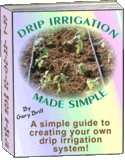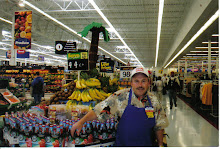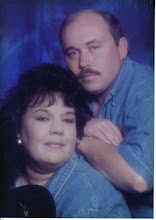Friday, March 20, 2009
Sunday, March 15, 2009
 Many plants have natural substances in their roots, flower and leaves that can repel or attract insects. The trick; of course, is to know which plants will do the attracting and which ones will do the repelling. This is a science that Herbalist and Horticulturist have been studying for centuries and in my opinion...they have only just scratched the surface.
Many plants have natural substances in their roots, flower and leaves that can repel or attract insects. The trick; of course, is to know which plants will do the attracting and which ones will do the repelling. This is a science that Herbalist and Horticulturist have been studying for centuries and in my opinion...they have only just scratched the surface.Probably the best study of this is nature itself. It appears that when God sits things in order, they seem to work in perfect harmony. However, when man steps in and thinks he can do a better job is when that harmony seems to blow up in our face.
Therefore, in my opinion, what we need to do is copy or duplicate nature and they way she sits things in order. Our ecosystem works on the process of integration where ever we go. So what we need to do is to incorporate this same philosophy into our own gardens.
It is not for me or even a horticulturists to say what is best for your little plot of land that you call your garden. The main reason is because of the fact that your garden is not like mine, nor is my garden like my neighbors. I would assume that in order for a Horticulturist to make the best decision for companion planting in your garden would be for them to design the garden from the very beginning.
And I will also offer you this small peice of information...it doesn't matter who designs your garden or what type of a degree they have...you're going to have bugs in your garden. It's nature for heavens sake.
Therefore, my suggestion is to first prepare and maintain your garden site as I have outlined in my book Simple Gardens Exposed. This process alone will cut the bad bugs and disease in your garden by at least 50%. Then I would suggest Integrated or companion planting. However, I don't feel that making a science out of the project is that important. The most important aspect of Integrated planting is to just MIX IT UP!
One tip that I will give you is to plant Garlic. Plant lots of Garlic everywhere. Plant it among your lettuce, cabbage, beets, corn etc. Don't be shy about it. If you don't the stuff, then give it to your neighbors and friends, but grow it. Garlic is a very strong smelling plant and their aren't many critters that like it. And the ones that do usually are under the soil. Garlic is not so much of a bug repellant as it is a cover-up. It's odor is so strong and far reaching that the bugs receptors will smell only Garlic instead of your lettuce. So plant lots of Garlic and send the bugs over to your neighbors garden.
I could spend probably two or three pages telling you which plants to plant next to your carrots and beans, and another two or three pages telling you what I don't know about what to plant next to where. Much of what scientist tell us is factuall, but the rest of it...I think the jury is still out.
I am all about simplicity in the garden. That's why I wrote my books. Why complicate what nature does so easily. Therefore, here is my very simple suggestion to companion planting. JUST MIX IT UP! Don't just plant a single row of anything. Start with some lettuce, then plant some carrots and then Garlic, then plant some herbs and so on and so on.
Plant lots of flowers in you gardens. Plant them every where. Don't go just helter scelter and throw the seeds in your garden like your feeding the chickens. You want a neat and organized garden, but inter-plant the flower among all the fruits and veggies. Just a few of the flower I like to plant in my garden is Coneflower,asylum,daisy,goldenrod and cosmos. These are anuals that attract butterflys and bees. Just make sure that they are anuals.
So naturalize your garden. Create an ecosystem that more closely immitates nature. If you have ever gone into an area that is relatively untouched by man; you will see that there is a few trees, some grasses, some flowers, bushes and etc. Nature just mixes it up.
You know that your garden is going to attract some bad bugs, but some of those flowers are going to attract some of the good bugs. And; of course, some of the good bugs eat the bad bugs and then your going to attract some birds also, and they are going to eat a few of the good bugs. What have you created?...harmony. Nothing seems to get out of control.
Plant lots of herbs. It doesn't matter if you like them or not...plant them and let some of them go to flower. This will attract a tremendous amount of good bugs. Bugs that will help pollinate your garden.
Don't get all tied up in knots about what to plant where, or what to plant next to what. In mixing up your garden in this manner, you will have a much healthier garden and you will have created a patch of ground that well resemble a miniature eden that you will love to work in.Read more!
Tuesday, March 10, 2009
Privacy Policy
Privacy Policy for http://www.simplegardensexposed.blogspot.com
If you require any more information or have any questions about our privacy policy, please feel free to contact us by email at simplegardens121@gmail.com.
At http://www.simplegardensexposed.blogspot.com, the privacy of our visitors is of extreme importance to us. This privacy policy document outlines the types of personal information is received and collected by http://www.simplegardensexposed.blogspot.com and how it is used.
Log Files
Like many other Web sites, http://www.simplegardensexposed.blogspot.com makes use of log files. The information inside the log files includes internet protocol ( IP ) addresses, type of browser, Internet Service Provider ( ISP ), date/time stamp, referring/exit pages, and number of clicks to analyze trends, administer the site, track user’s movement around the site, and gather demographic information. IP addresses, and other such information are not linked to any information that is personally identifiable.
Cookies and Web Beacons
http://www.simplegardensexposed.blogspot.com does use cookies to store information about visitors preferences, record user-specific information on which pages the user access or visit, customize Web page content based on visitors browser type or other information that the visitor sends via their browser.
DoubleClick DART Cookie
.:: Google, as a third party vendor, uses cookies to serve ads on http://www.simplegardensexposed.blogspot.com.
.:: Google's use of the DART cookie enables it to serve ads to users based on their visit to http://www.simplegardensexposed.blogspot.com and other sites on the Internet.
.:: Users may opt out of the use of the DART cookie by visiting the Google ad and content network privacy policy at the following URL - http://www.google.com/privacy_ads.html
Some of our advertising partners may use cookies and web beacons on our site. Our advertising partners include ....
Google Adsense
These third-party ad servers or ad networks use technology to the advertisements and links that appear on http://www.simplegardensexposed.blogspot.com send directly to your browsers. They automatically receive your IP address when this occurs. Other technologies ( such as cookies, JavaScript, or Web Beacons ) may also be used by the third-party ad networks to measure the effectiveness of their advertisements and / or to personalize the advertising content that you see.
http://www.simplegardensexposed.blogspot.com has no access to or control over these cookies that are used by third-party advertisers.
You should consult the respective privacy policies of these third-party ad servers for more detailed information on their practices as well as for instructions about how to opt-out of certain practices. http://www.simplegardensexposed.blogspot.com's privacy policy does not apply to, and we cannot control the activities of, such other advertisers or web sites.
If you wish to disable cookies, you may do so through your individual browser options. More detailed information about cookie management with specific web browsers can be found at the browsers' respective websites.
--------------------------------------------------------------------------------
Read more!

Simply Growing Garlic for the Home

Drip Irrigation Made Simple

In answer to Linda's request for books

This is the guide for the gardener who wishes to cut the labor in his garden by more than half.
If you want to greatly reduce or eliminate weeding, fertilizing and fighting so much disease, then read Simple Gardens Exposed.
http://www.simplegardensexposed.com/Read more!
Saturday, March 7, 2009

The Simple Way to Grow the Potato
Now is the time to think about planting Potatoes. It would be a good idea to look into your region and see when is the best time to plant. However, the emphasis here is not when to plant, but to be ready when it is time to plant.
What you will want to concentrate on right now is making sure that you have the starts. You can either wait and pick up the starts at a nursery or feed store, or you can buy up some Potatoes' from your local grocery store and put them away in the garage or basement until it's time to plant. Just leave them alone and let them sprout. This could take a while, so buy them NOW and be ready. Now for the simple way to grow the Potatoe. Find some old straw. It really doesn't matter what kind...just make sure it's older.
When it's time to plant; take that straw out to the garden and lay down a bed of straw about 4" deep where your intended Potatoe row or rows are going to be in the garden. Next step is to cut your sprouted Potatoes into 2-4 peices and then place them on top of the straw with spacing of about 10-12" apart. After you have laid down all of your starts, then cover them up with about 6" of that same old straw. Don't forget to use Drip Irrigation for watering.
Now just walk away until it's time for havesting. It won't be long before you will see the plants start to push up through that straw. When you are ready to harvest; just pull back the straw and most of the Potatoes will be laying on the surface of the straw that you planted them on and they will be nice and clean and easy to pickup. You don't have to dig them up. HOW SIMPLE IS THATRead more!
Thursday, March 5, 2009
Inspire to Garden

Inspire to Garden
Inspiration comes to us in many forms. A pastor might inspire you to live closer to God. Someone who is trying to sell you a diet pill will show you before pictures of a woman when she was over-weight and then an after pictures of when she lost the weight. We get inspired in many different ways. We see our food being contaminated with Ecoli, salmonella, botulism or any other type of disease and feel the government should be doing a better job of protecting our food. And I will certainly agree that protecting our food should be a priority. So if I could offer a little bit of inspiration to you.
Grow your own garden and you will have control of those diseases'. Grow your own garden and save yourself lots of money. Grow your own garden and get more nutrition from the foods you eat. Inspire your entire family to get involved. Your children will learn more responsibility; they will be better nourished and if you grow a little extra...help feed a community in need. Grow a garden and feel better because of it.
Read this article: http://www.no-dig-vegetablegarden.com/vegetable-nutrition.html
Read more!









